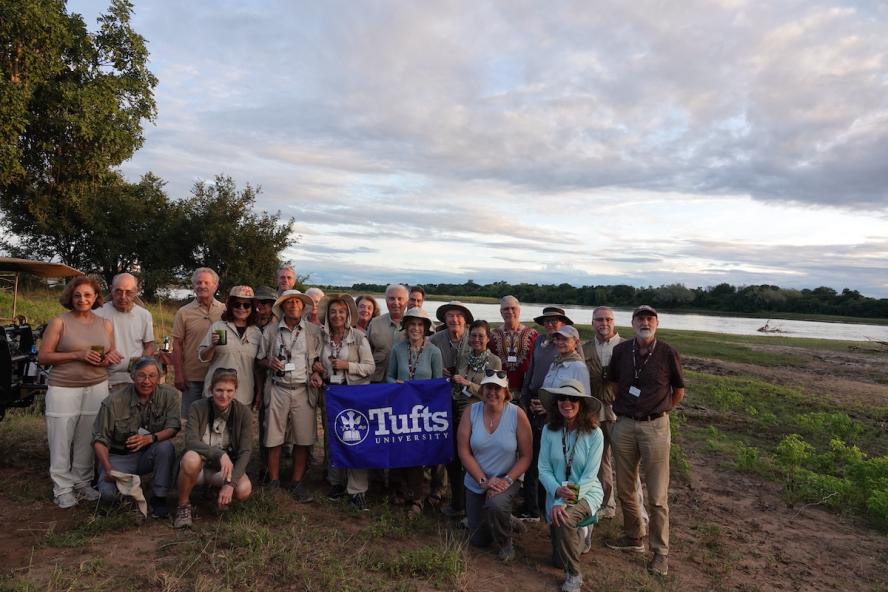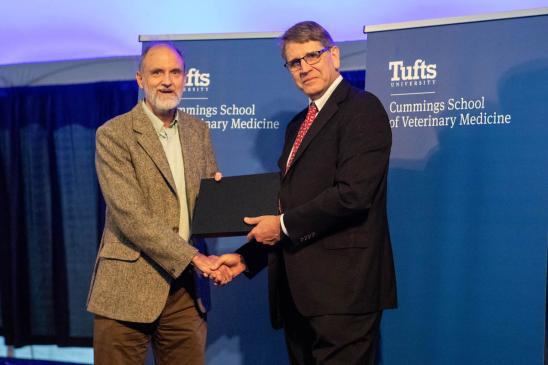-
About
- Leadership & Faculty
- News & Events
-
Academics
- Graduate
- Advanced Clinical Training
- Continuing Education
- Academic Offices
-
Student Life
-
Research
-
Hospitals & Clinics
- Emergency Care
- Hospital Services
-
Community Outreach
- Volunteer
Blood Fluke Education
Cummings School’s Dr. Patrick Skelly educates in Africa on Tufts Travel-Learn excursion

Now in his 20th year of teaching at Cummings School of Veterinary Medicine, Dr. Patrick Skelly (he/his) serves as a professor and associate chair in the Department of Infectious Disease and Global Health, and runs the Molecular Helminthology Laboratory in collaboration with Drs. Chuck Shoemaker and Akram Da’dara.
At Cummings School’s annual Dean’s Dinner, held May 19, Skelly was one of four Faculty Excellence Award recipients, earning the Zoetis Distinguished Veterinary Teacher Award.
The Molecular Helminthology Lab investigates the host-parasite interface of intravascular worms called schistosomes, which claim the lives of hundreds of thousands of people annually, according to the World Health Organization, while regularly infecting wildlife and livestock, resulting in economic hardship in numerous developing nations.
Adult worms, or blood flukes, live in the host’s vascular system, where they can survive for many years while the female produces hundreds of eggs daily. Skelly’s research aims to better understand how the worms thrive in their hosts for years and is working to identify and develop better ways to treat or prevent blood fluke disease (schistosomiasis).
Skelly participated in the Tufts University Travel-Learn Program’s April trip to Southern Africa, which included stops in Botswana, South Africa, Zambia, and Zimbabwe. Each year, Travel-Learn offers up to 25 group trips for Tufts alumni and friends to explore various destinations across the globe. Many of the trips include a Tufts faculty member to serve as host, share their expertise, and enrich the experience.
A native of Ireland, Skelly was trained as a zoologist at University College, Dublin, Ireland, and earned a Ph.D. from the Australian National University. He presented two talks during the trip, which were well-received by the trip’s travelers, and characterized by them as “informative and entertaining.”
On the day the group, while on safari, saw the black rhinoceros, Skelly gave a presentation that evening about rhinos. “I was reading a book, The Last Rhinos, at the time and spoke to the group about interesting aspects of rhino biology and conservation,” Skelly says. “Seeing the animals and giving the talk on the same day was unplanned, but well-timed.”
His second talk centered around his lab work on blood flukes, which are particularly prevalent in Africa. “Most of the people that are infected with these water-borne parasites and contract schistosomiasis are found in Africa,” Skelly explains.
In fresh water, the larval stages of the worm are released by infected snails, penetrate your unbroken skin, and enter a blood vessel. They circulate in the bloodstream, and the males and females find each other in the vessels of the liver and migrate together to the intestines. The females lay eggs which pass into the space (lumen) of the intestine, and when you go to the bathroom, the eggs of the parasite are released. The eggs hatch in water, and the larvae that emerge infect freshwater snails, to complete the life cycle.
Estimates from the World Health Organization are that more than 250 million people required preventative treatment for schistosomiasis in 2021, and more than 90 percent of them reside in Africa. The disease elicits strong immune reactions and causes progressive damage to organs.
The recommended treatment is Praziquantel, which is effective, safe, and low-cost. “It’s been around for many years, and there’s a concern that drug resistance will develop,” Skelly shares. “Many are calling for the development of new drugs in case resistance does arise. So, we and other labs are searching for new treatments. At Tufts we aim to understand the biochemistry of the worm’s unique surface, and then block it in certain ways with new drugs or a vaccine, and in this way, we aim to debilitate and kill the worms.” Skelly and his colleagues are collaborating with other research entities such as Moderna and the Broad Institute of MIT and Harvard to identify novel schistosome-killing drugs and to develop RNA vaccines to treat and prevent this major, neglected global disease.
Department:
Dept. of Infectious Disease and Global Health
